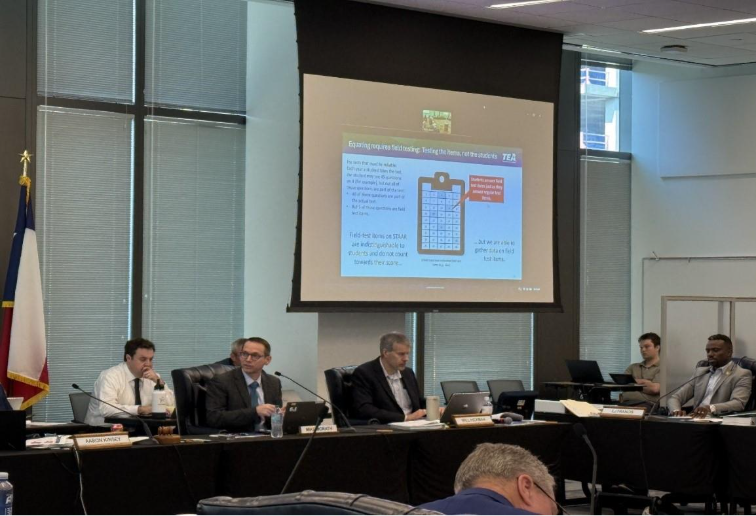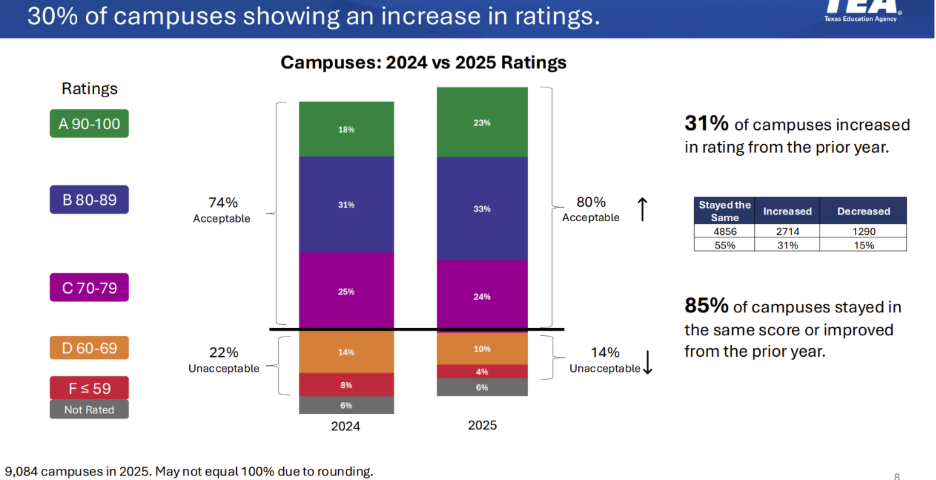SBOE continues work on social studies framework

Date Posted: 9/15/2025 | Author: Heather Sheffield

The State Board of Education (SBOE) met Sept. 8–12 in Austin. SBOE members’ agenda included a review of new curriculum requirements, including updates to the personal financial literacy and economics TEKS mandated by HB 27, and continued work on revising the social studies framework. The board also received public testimony on new instructional materials in math and language arts that will be adopted for district use in upcoming years and directly shape what students and teachers work with in class. Only one curriculum/textbook author testified Sept. 9, but 41 people signed up to speak before the board took up social studies. The board also received comments from Texas Education Agency (TEA) Commissioner Mike Morath, who spoke and answered questions for an hour.
Commissioner comments
Morath reported that the 2025 A–F accountability results show 31% of campuses had improved their ratings, including more than 360 high-poverty schools that earned an “A.”

Statewide College, Career, and Military Readiness rose to 82%, and elementary and middle schools posted the strongest academic growth.
The commissioner also reviewed the TEA process intended to keep STAAR results consistent across years and highlighted the SBOE’s adoption of new high-quality instructional materials, including TEA’s Bluebonnet Learning resources, which many districts have already implemented due in large part to the financial incentive to use the material and the alignment with STAAR.
The commissioner was defensive of STAAR scores and discussed House Bill (HB) 8, recently passed by the Texas Legislature in its second special session of 2025, as a win in his opinion. HB 8 did not repeal STAAR as legislators and others have touted; instead, it rebrands STAAR, expands the number of state-mandated tests, maintains the commissioner’s authority over the testing and accountability system, and largely removes the power of local communities to take legal action against the state if they find flaws in the system.
Between the new assessment and accountability system that will roll out due to the passage of HB 8 and the extra funding districts receive, many districts have begun using the incentivized curriculum as shown in the graphs above. The commissioner reported many districts have not yet adopted the incentivized instructional materials, so there is money rolling forward for districts to use in the future.
SBOE action items and discussions
- In one of its most closely watched actions, the board voted 8–7 to approve a controversial new social studies framework that shifts instructional time in the K–8 grades toward Texas and U.S. history while reducing emphasis on world history, cultures, and geography. The framework sets the stage for a full rewrite of the Social Studies TEKS, which is expected by summer 2026, and will directly shape classroom expectations for years to come. This decision sparked significant debate and will be important for educators to monitor as the SBOE names content advisors and drafts standards.
- The SBOE will designate up to seven content advisors (for foundation subjects, the higher ed commissioner names two additional content advisors) who will provide feedback on the current TEKS and develop recommendations for the review. Up to nine content advisors will be designated. To be designated as a content advisor, an individual must have: (1) a minimum of a bachelor's degree from an accredited college or university; (2) demonstrated expertise in the subject area in which they are being appointed; and (3) either taught or worked in such a field. If you are interested in becoming a content advisor, please reach out to your SBOE member to alert them that you would appreciate their consideration for nomination.
- The board advanced amendments to the Career and Technical Education (CTE) TEKS in Agriculture, Food, and Natural Resources. Notably, the Livestock and Poultry Production course (§127.49) and related courses (§127.51, §127.52) were updated to adjust prerequisites and align course sequencing with programs of study. For agriculture educators, these changes affect how courses are structured and delivered.
- SBOE acted on renewals of innovative courses under §74.27. Districts will continue to be able to offer ethnic studies courses such as African American Studies, Mexican American Studies, Native American Studies, and Asian Pacific Islander Studies while they remain outside the formal TEKS framework. Renewals ensure these courses remain available for students for the next several years.
- The board approved on first reading changes to gifted-and-talented identification rules that would require trained committees and updated criteria, as well as engaged in discussion of new CTE TEKS in other career clusters such as law and public service.
- Finance discussions touched on the Available School Fund apportionment rate, which impacts district budgets.
- The board also received updates on new charter school applications, which can affect enrollment and staffing at the local level.
Overall, the September meeting highlighted curriculum revisions, instructional materials adoption, innovative course renewals, and charter expansion—all issues teachers should follow closely as they will directly influence classroom practice and long-term planning.
CONVERSATION
RECOMMENDED FOR YOU

02/27/2026
Teach the Vote’s Week in Review: Feb. 27, 2026
SBOE approves 4,200 edits and corrections to Bluebonnet Learning instructional materials. Plus: Election Day is Tuesday, March 3.

02/27/2026
SBOE special-called meeting highlights philosophical divides
The Texas State Board of Education met for a full day on February 25th in a special-called meeting.

02/24/2026
Get out and early vote this week for important statewide offices
It’s time to Teach the Vote in the races for Texas governor, lieutenant governor, attorney general, and comptroller.

